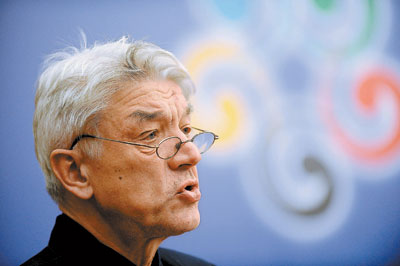
GERMAN Sinologist Wolfgang Kubin has never hidden his dislike of Mo Yan, who won the Nobel Prize in Literature last year, and, after re-reading Mo’s work, Kubin has not changed his opinion, saying: “I still don’t like his works.”
However, what Kubin does not like is not only Mo’s work but all story-telling novels in general.
“Firstly, his works are telling stories and I don’t like stories. I like thinking about complicated things. In Germany, the story time has gone since 1945,” Kubin said.
“Moreover, I don’t like the way he uses adjectives. There is one book — I forget its name — but in that book, he describes people with adjectives which are used to describe animals. This makes me feel that all the people in that book are bad people who are thinking about killing others and don’t have love in their hearts. I don’t know if it is reality or a fable.”
But the fact that Mo was awarded the Nobel Prize made Kubin realize that it is wrong to say that there is only one good type of literature which everybody must like.
“It’s just like you can’t say everybody should read ‘A Dream of Red Mansions.’ Literature has different schools and each school has its readers. Readers will also choose works which are suitable for them,” he said.
“I found that I now like something which I didn’t used to like. So it may have something to do with literary development and my age. There is no standard and it is hard to say which book is good. This is why I am more tolerant with literature and people now. But of course, I have no right to disapprove of Mo’s win.”
Kubin recently won the Johann-Heinrich-Voß-Preis, which is the highest translation award in Germany, the first time that a Sinologist has won. Kubin has spent much of his career as a lecturer at universities around China. He is now dean of the German Department at Ocean University of China in Qingdao, Shandong Province, and he hopes to translate more outstanding German literature into Chinese, allowing more Chinese people to gain a better understanding of German culture.
As a translator, Kubin also thinks that translation plays an important role in Mo’s Nobel Prize win.
“Howard Goldblatt is a brand in translating Chinese works into English. Any publishing house will approve his translation work,” Kubin said, adding that people will rush to buy novels that Goldblatt has translated because everybody thinks his work is of a high standard.
However, Kubin does not completely agree with this assessment of Goldblatt. “He said that his translations string along with the original works, but after comparing his work and the original one, you will find that he deletes many sentences and even paragraphs. He always reads the original work and gets its general points and then translates the book in a way which will be liked by readers. You can say that he creates foreigners’ favorite Chinese contemporary literature,” Kubin said.
And he cites “Wolf Totem” as an example. “This book was translated into German many years ago, but it has not been published as there are some ideas and thoughts which cannot be accepted by German readers. When Goldblatt’s English version was out, the German publishing house found that those unacceptable ideas and thoughts were deleted. So the German publishing house published the book according to the English version and the book sold quite well. In my opinion, I think that Mo’s English work should have two authors, Mo and Goldblatt,” he said.
Many Chinese authors and literary reviewers say that Kubin always criticizes Chinese contemporary literature, particularly novels. Kubin said: “I think the more important thing is whether my points are worth discussing. I don’t expect that my points are right — I hope that people can think about the issues I make.”
He has always maintained that Chinese writers cannot go far on the international stage as they don’t understand other languages. “A German author said that if an author only knows one language, he knows nothing, because he cannot explore his own language from the point of view of other languages,” he said.
Moreover, an author who is not fluent in a foreign language will have no right to comment on the translation of his or her own work.
“He does not even know whether this translation work is good or bad. He cannot communicate with other overseas authors and can not introduce his colleagues to others. In the early 1900s, many famous Chinese authors, such as Lu Xun and Zhou Zuoren, were great writers and outstanding translators. Qian Zhongshu could even read Latin,” he said.
In order to introduce Chinese literature to international readers, China needs writers with outstanding language ability of not only his mother tongue, but also foreign languages.
(Wang Yuanyuan)
“I think the more important thing is whether my points are worth discussing. I don’t expect that my points are right — I hope that people can think about the issues I make.”
— Wolfgang Kubin
|

